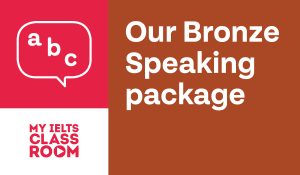
5 tips for practicing without an IELTS speaking partner!
5 tips for practicing without an IELTS speaking partner!
Hey! We all know that the best way to improve our speaking is to work with an experienced teacher who can guide you and target your practice to focus on each of the IELTS speaking band descriptors. But what if you can’t afford a teacher, or you want to practice more outside of class? Well, today I will give you five pieces of advice that you can use to improve your performance at home without an IELTS speaking partner or a teacher.
1. Focus on Fluency
Be realistic about what you can achieve. Unless you have a very high-level of English, it is unlikely that you will be able to recognise your own grammar and lexis errors. That is OK. I would focus your solo practice on building your fluency. Many students complain that they “know the words” but just can’t produce them in a test.
What this means is that they have a much higher passive knowledge of language than active. So, how can you turn that dictionary in your mind that recognises words into a dictionary in your mouth that can produce them? PRACTICE!
 Recording yourself attempting cue cards is pretty much the perfect way to do this. Go to a Cambridge book, find a high-quality question, give yourself one minute to prepare, and then hit “record” on your computer or mobile device. Try to get to the stage where you can talk effortlessly for two minutes about any of the topics. If you aren’t successful the first time, then go back and TRY AGAIN!
Recording yourself attempting cue cards is pretty much the perfect way to do this. Go to a Cambridge book, find a high-quality question, give yourself one minute to prepare, and then hit “record” on your computer or mobile device. Try to get to the stage where you can talk effortlessly for two minutes about any of the topics. If you aren’t successful the first time, then go back and TRY AGAIN!
That is the beauty of practicing alone – nobody minds if you stop and start again! In fact, doing the same cue card again and again is one of the best ways that you can increase your fluency, so don’t be afraid to return to a topic multiple times.
- Keep getting stuck on one word in a sentence? Then learn how to paraphrase by clicking here
- Finding some cue cards harder than others? Then learn about the different types of cue card here
- Finding it hard to keep speaking for two minutes? Then find out more here.
Plus, when you finish speaking for two minutes (and you must always stop the minute you reach two minutes), then listen back to your performance and check a few simple things:
- Were you using the correct tense in your response? (i.e. if the card asked you to describe an experience in the past, did you use past tenses in that part of your speech?)
- Did you talk at the right speed? Speaking too quickly or too slowly can have an effect on your pronunciation and fluency and coherence score, so you really want to get this right.
- Are there any words that you think you may have mispronounced? Then Google them to check – even better, give your recording to a friend to see if they can understand everything you say!
How long should your answers be in Speaking Part 1? Watch to find out!
2. Fill in your lexical gaps.
Most students learn lexis “back to front”. By this, I mean that they learn a new word and then look for an opportunity to use it in the test. I think you should do the opposite. You should only use the words in the test that you naturally need – forcing “high-level” lexis into your sentences never sounds natural and has a high chance of leading to a low score.

So, how do you know what language you will naturally need in the test? Easy! Take the practice exam questions from a recent Cambridge book and answer them one by one honestly and naturally. As you are answering each question, what words or phrases are you missing to express yourself clearly? Write them down (in your own language) and then look for them in a dictionary.
I have found that students remember words they NEED much more quickly (which is why the first words I learn when I live in another country are the words for food!). If you can do this for a range of speaking topics, then you will soon build up a bank of useful, natural lexis.
Want to listen to two IELTS experts discuss why “forcing” high-level lexis into your response is a bad idea? Then listen to this episode of the My IELTS Classroom podcast, where Nick and I discuss the IELTS Speaking Band Descriptors and where students most often “go wrong”.
3. Practice pronouncing individual sounds with a dictation Application
Do you struggle with a particular English sound? Maybe it is the /ð/ in “this” and “there” or the long /iː/ in sheet or meet. If you do, then you should work hard to make sure that these problems do not have an impact on your communication. You should be particularly careful of minimal pairs. These are sounds that alter the meaning of words when changed. For example:
/l/ and /r/ like in the words light and right
/b/ and /v/ like in the words very and berry
/b/ and /p/ like in the words bet and pet
/ɪ/ and /iːp/ like in the words ship and sheep
If you know what sounds are hard for you to produce, then why not practice speaking words with these sounds into a note-taking app on your phone (i.e. like Notes on an iPhone) to see if it can understand you. If you say “right” and the app shows “light”, you know that you need to work harder! Here are some links to some useful word links that will show you common minimal pairs between English and your own language and some words you can use to practice:
- Minimal pairs for Arabic speakers
- Minimal pairs for French speakers
- Minimal pairs for Japanese speakers
- Minimal pairs for Spanish speakers
- Minimal pairs for Korean speakers
4. Work on your Intonation
One of the best ways to improve your speaking score is to work on your sentence stress. Too many IELTS test-takers either sound like robots when they speak because they put the same stress on every word, or they speak too quickly and so have no intonation at all! Native speakers place pauses between words to emphasise the most important ones, and you should try to do this too.

There are two ways you can do this – the first is simply imitating native speakers. I don’t mean that you should copy the sound of their voice (remember that IELTS does not test accent). What I want you to copy is the rhythm. If you can learn to break your sentences into the right “chunks”, this will have a fantastic effect on your own speech (and is often the main benefit from watch TV series’ in English).
So, find a TV series or a podcast that you like, and then pause and copy the sound of the speakers. Will you feel silly? Maybe! But the more you copy, the better your sentence stress will be.
Learn how to chunk
Another good practice is writing down your answer to a question, and then practice “chunking” it. What does that mean? Well, it means try to think where you would naturally pause in the sentence. I do this by placing two lines like this between words that will have a big pause //, and one line for a short pause /. Then, you can practice speaking the sentence again and again until it sounds natural. For example, look at this answer and decide where you would naturally pause in your speech:
Examiner: Does the weather change much in your country?
Test-taker: Well, not really. Generally, it is really hot and humid in the summer, which is not very nice, but then the winters are pretty mild. That said, it can rain a lot in November and I remember it snowed once when I was a kid, but that’s not very common.
I think that your answer should look something like this:
Examiner: Does the weather change much / in your country?
Test-taker:Well, //not really. // Generally, / it is really hot and humid in the summer, // which is not very nice, // but then the winters / are pretty mild, // which is fantastic. That said, // it can rain a lot in November // and I remember it snowed once / when I was a kid, // but that’s not very common.
Try speaking this now with the pauses in the right place. Does that feel natural to you? It should! You don’t want to take long pauses every time there is a // or /, you want to separate the words long enough for you to get the rhythm right!
5. Find an IELTS speaking partner to practice with
I know, I know, I know – this blog post is about how to practice for IELTS speaking without a partner! Yes, you can practice on your own, but it is always better to work with another person if you can. I will always pair my students with one another if they ask me to – and I am sure that you can find a partner to practice with if you post in a Facebook group (just please be careful – never share your personal details on a public page!).
Again though, it is important that you are realistic about what you expect from a partner. You are not a teacher, and neither are they, so they are unlikely to be able to help you with your grammar or vocabulary.

In fact, think carefully about who you choose as an IELTS speaking partner. If you can, find a student who is at least the same level as you (if not slightly higher) as working with a lower-level student can have a negative effect on your own performance as you may start mirroring their errors!
The benefit of working with a partner is that you can make your practice feel more “real” and you will feel more confident speaking English in front of another person (because you really don’t want the first time you speak out loud in front of somebody to be in the exam!). If you are working with an IELTS speaking partner and are playing the role of examiner, then try to do the following in each part of the test:
IELTS Speaking Part 1
- Deliver the questions in a natural way and only ask “why” or “why not” if your partner hasn’t extended enough (or hasn’t already told you “why”). This is what the examiner does in the test.
- At the same time, remember that you only have a maximum of 5 minutes for the opening frame (work or home) and then two more topics (i.e. 11 questions). As the examiner, your job is to interrupt the student if they are talking for too long!
IELTS Speaking Part 2
- Obviously, your main job here will be to control time. Stop your partner as soon as the two minutes is up. If they finish early, gently ask them “Is there anything else you can tell me about that?”
- Pay attention to your partner’s tenses – if the cue card asks them to describe an event in the past, make sure they stick to past tenses! This can be an easy problem to spot.
- Also, were there any words that you did not understand? Tell your partner so they can work on their pronunciation.
IELTS Speaking Part 3
- Ask follow-up questions if you want to know more about your partner’s opinion.
- Also, don’t let them speak on and on about a topic for more than 30 seconds – the examiner won’t allow them to do this, so neither should you! Try to interrupt with the next question or a follow up question.
- When your partner has finished answering a question, offer other possible answers so that you can help each other with ideas.
Again, an IELTS speaking partner is not a teacher, so do not expect them to be able to correct your errors or gives you an accurate score. Just use each other to make the practice experience as realistic as you can.
Wow – there was a lot of information in this lesson, so let’s review what we have learned today (you can take a screenshot of this to help you remember how to practice):
5 tips for practicing without an IELTS speaking partner!
- Focus on fluency: it’s not very realistic to expect to improve your grammar on your own, but you can definitely work on being able to speak without pauses by recording your responses. Don’t be afraid to practice the same questions again and again!
- Fill in your lexical gaps: The best way to improve your vocabulary is to learn words that YOU are missing! As you practice answering IELTS questions naturally, take note of any words or expressions that you are missing. Obviously, you can paraphrase the missing words, but why not take this chance to learn them instead.
- Practice pronouncing individual sounds with a dictation Application: If you make repeated errors with a single sound, then you are going to find it hard to score more than a 6.0 for Pronunciation. Use your practice time to do some drills on minimal pairs or other sounds you find difficult.
- Work on your Intonation: Pronunciation is much more than just individual sounds. If you are aiming for the highest scores, then you really have to show good sentence stress. Copy native speakers or practice ‘chunking’ to help you do this.
- Find a partner: There really is only so much that you can practice on your own. If you can find another student who is a similar level to you, then you can work together to make your practice feel as close to the tests as possible.
Speaking is an active skill that takes a lot of practice. If you can invest in guidance, then you will find that your IELTS journey is much shorter and more effective. However, ANY practice is good practice and spending just 15 minutes a day working on your speaking can make a massive difference to your final performance.
Would you like expert help to improve your IELTS speaking score?
We offer a 5-day intensive course for IELTS test-takers every month that covers all aspects of speaking, from how to approach each section to how to paraphrase well or address the most difficult questions in Part 3. Even better, with every course being run by an ex-examiner, you will be getting feedback is guaranteed to help you to improve your score. You can read more about the course here.

